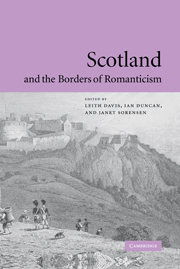Book contents
- Frontmatter
- Contents
- List of contributors
- Acknowledgments
- Introduction
- 1 Coleridge, Hume, and the chains of the Romantic imagination
- 2 The pathos of abstraction: Adam Smith, Ossian, and Samuel Johnson
- 3 Antiquarianism, the Scottish Science of Man, and the emergence of modern disciplinarity
- 4 Melancholy, memory, and the “narrative situation” of history in post-Enlightenment Scotland
- 5 Scott, the Scottish Enlightenment, and Romantic Orientalism
- 6 Walter Scott's Romantic postmodernity
- 7 Putting down the Rising
- 8 Joanna Baillie stages the nation
- 9 William Wordsworth and William Cobbett: Scotch travel and British reform
- 10 Burns's topographies
- 11 At “sang about”: Scottish song and the challenge to British culture
- 12 Romantic spinstrelsy: Anne Bannerman and the sexual politics of the ballad
- 13 “The fause nourice sang”: childhood, child murder, and the formalism of the Scottish ballad revival
- Index
4 - Melancholy, memory, and the “narrative situation” of history in post-Enlightenment Scotland
Published online by Cambridge University Press: 22 September 2009
- Frontmatter
- Contents
- List of contributors
- Acknowledgments
- Introduction
- 1 Coleridge, Hume, and the chains of the Romantic imagination
- 2 The pathos of abstraction: Adam Smith, Ossian, and Samuel Johnson
- 3 Antiquarianism, the Scottish Science of Man, and the emergence of modern disciplinarity
- 4 Melancholy, memory, and the “narrative situation” of history in post-Enlightenment Scotland
- 5 Scott, the Scottish Enlightenment, and Romantic Orientalism
- 6 Walter Scott's Romantic postmodernity
- 7 Putting down the Rising
- 8 Joanna Baillie stages the nation
- 9 William Wordsworth and William Cobbett: Scotch travel and British reform
- 10 Burns's topographies
- 11 At “sang about”: Scottish song and the challenge to British culture
- 12 Romantic spinstrelsy: Anne Bannerman and the sexual politics of the ballad
- 13 “The fause nourice sang”: childhood, child murder, and the formalism of the Scottish ballad revival
- Index
Summary
… time or succession is always broken and divided.
David Hume, A Treatise of Human Nature (1739)In a memorable prolepsis in her Letters from France (1790) Helen Maria Williams anticipates “grateful” generations in the future flocking to the Champs de Mars, site of the Festival of the Federation in Paris on July 14, 1790, an event which epitomized for Williams, as for many others, the liberal promise of the Revolution. Elaborating the imagined scene, Williams presents the visitors eagerly pointing to and searching out the spots “where they have heard it recorded” that various participants in the festival took their places, and then stops to comment: “I think of these things, and then repeat to myself with transport, ‘I was a spectator of the Federation!’” The redundancy of this declaration – she and her readers already know she was a spectator – underlines the paradoxical point of the rhetorical maneuver: in anticipating a time when she no longer is, Williams not only assures herself that she has been but does so by transforming a central experience of her own life into a vital memory for those who will come after. Reiterating her presence at the scene, she inscribes herself into a larger narrative of historical continuity that confirms and extends her own present-tense narrative of contemporary witness.
- Type
- Chapter
- Information
- Scotland and the Borders of Romanticism , pp. 77 - 93Publisher: Cambridge University PressPrint publication year: 2004
- 4
- Cited by



